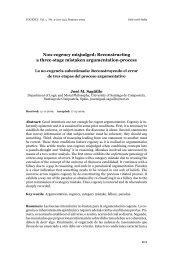Cogency v2 n2
Cogency v2 n2
Cogency v2 n2
You also want an ePaper? Increase the reach of your titles
YUMPU automatically turns print PDFs into web optimized ePapers that Google loves.
COGENCY Vol. 2, N0. 2, Spring 2010<br />
which, ex hypothesi, is private. This is not quite the same sort of situation as<br />
“a person… who constructs an argument for his own edification” of which<br />
Hamblin says that “we might follow Wittgenstein in finding something peculiar<br />
about this case.” I do not understand just what Hamblin is saying<br />
here, how exactly he believes the Diary example can be adapted here. Nor<br />
do I think Wittgenstein would find the proposed example (constructing an<br />
argument for one’s own edification) peculiar–for there is indeed just such a<br />
“language-game.”<br />
Hamblin goes on to make a rather strong and startling claim: “The<br />
broader point here is that dialectical concepts are fundamental ones in that<br />
the “raw facts” of the dialectical situation are that participants put forward<br />
and receive various statements.” Hamblin believes that the view that “dialectical<br />
concepts are … fundamental” is Wittgensteinian. That becomes clear<br />
when we read p. 285, where the idea of “dialectic” is clarified with this reference:<br />
If we want to lay bare the foundations of Dialectic, we should give the<br />
dialectical rules themselves a chance to determine what is a statement,<br />
what is a question. This general idea is familiar enough from Wittgenstein<br />
in Preliminary Studies… [here he refers to The Brown Book] as having<br />
“the best examples of dialectical analysis.”<br />
And then he goes on to say that “[t]he thesis that I shall adopt is that all<br />
properties of linguistic entities are “dialectical” in the sense of being determinable<br />
from the broad pattern of their use” (p. 285, emphasis mine). By<br />
“broad pattern of their use,” (which may be associated with his notion of<br />
dialectic), he may be referring to what Wittgenstein called “depth grammar”<br />
(PI, #664). His claim seems quite clearly in the spirit of #43 of the<br />
Philosophical Investigations where Wittgenstein writes:<br />
For a large class of cases, though not for all, in which we employ the<br />
word “meaning,” it can be defined thus: the meaning of a word is its use<br />
in the language. And the meaning of a name is sometimes explained by<br />
pointing to its bearer.<br />
98








